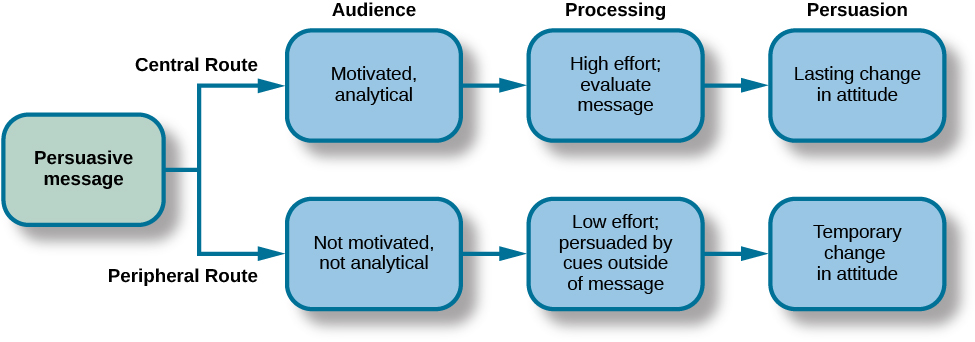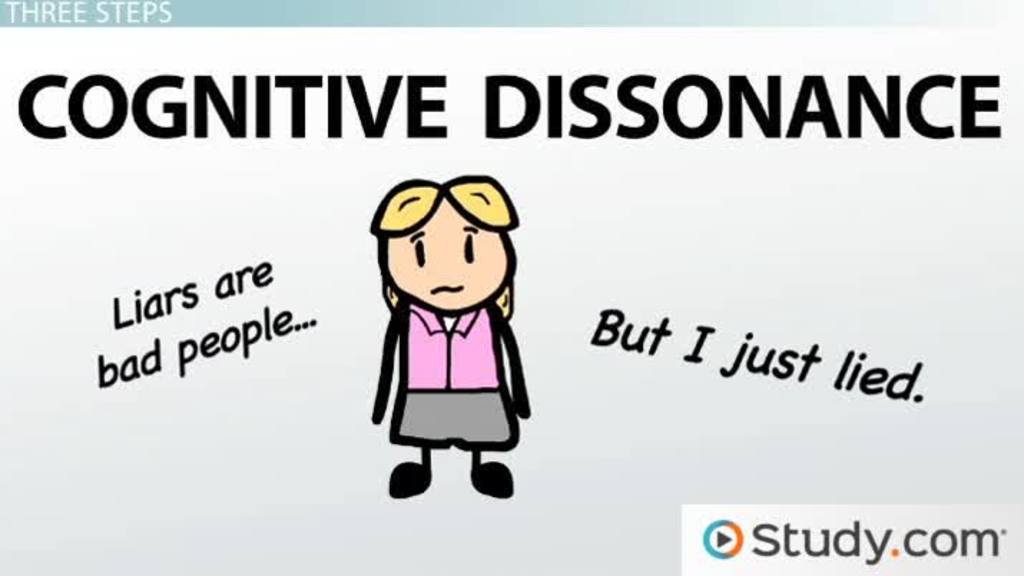Browse By Unit
9.2 Attitude Formation and Attitude Change
4 min read•june 18, 2024
Dalia Savy
Sumi Vora
Dalia Savy
Sumi Vora
Attitudes
Even though circumstances do play a substantial role in how we behave, our attitudes are a big reason why different people may respond differently in the same situation. Our attitudes are dictated by our beliefs or feelings that predispose us to respond to situations in a particular way.
Keep in mind that attitudes aren’t the same thing as personality—while personality is our lasting traits 🧬, attitudes are our lasting beliefs 💭
Persuasion
Our attitudes are molded throughout our lives. Almost every billboard, advertisement, song 🎵, conversation, or news article we read is trying to persuade us to change our attitudes.
The elaboration-likelihood model proposes that there are two types of persuasion: central route persuasion and peripheral route persuasion.
- Central route persuasion offers logical evidence and arguments that aim to trigger favorable thoughts about an idea. It's effective when people are interested in the topic or have the time and energy to think over an issue 🤔- This route of persuasion is used in speeches. For example, Greta Thunberg, a civil rights activist, presented a speech about climate change. To establish ethos, or to sound credible, she used statistics and actual evidence about climate change and how it's affecting our earth 🌎
- On the other hand, peripheral route persuasion causes people to respond to incidental cues that make them see an idea favorably (think celebrity endorsements). Peripheral route persuasion is more likely to work when people are less invested in the issue, so they will respond to superficial ideas. If there are no external pressures to behave in one way, people’s attitudes will impact their behavior. - An example of where the peripheral route is used is in commercials! You aren't really paying much attention to the commercial, but seeing a tasty burger does make you hungry and changes your attitude 🍔. This is how commercials work in luring in customers.

Image Courtesy of Lumen Learning.
Attitudes Affecting Behaviors
Attitudes directly affect one's behaviors. You should be familiar with two terms that have to do with this:
- Foot in the door phenomenon🦶🚪: when someone starts with a small request and builds up to a larger request. Doing this makes people believe in the actions they are doing and makes them more likely to comply and respond to the large request. This is seen in history multiple times.- When the Korean War ended, 21 prisoners chose to stay with the communists in China purely because of this phenomenon. Gradually during the course of the war, they were convinced that communism is the right policy for Asia because of the small favors they had to do and the torture they went through; it's very psychologically damaging.
- Door in the face phenomenon🚪🥺**:** when someone starts with a large request that the other person would turn down, and then asking a more reasonable request that the person would accept. To the person being asked, this is a win-win situation, but the person asking the request is simply ensuring they get what they want. Do what you will with this information, but make sure it's good 👀!
Cognitive Dissonance Theory
When we are forced to act in ways against our attitudes or moral standards, we often rationalize our behavior. The cognitive dissonance theory, proposed by Leon Festinger, states that when there is a disagreement between what we do and what we believe, we change our attitudes to reduce the cognitive dissonance, or tension, that arises from that disagreement. He conducted an experiment about cognitive dissonance in which he had a group of subjects to complete a boring task. Then, he paid subjects 1 to lie to other people, telling them the task was actually interesting. Interestingly, after 2 weeks, the group that was paid 1 changed their opinion and said it was actually an interesting task. This is because when both groups were lying, the group that got 20 had enough justification ("I was paid") so they didn't change their opinion.

Image Courtesy of Study.
This is one theory about why soldiers in Nazi Germany were "brainwashed" into believing anti-semitic propaganda by being forced to commit horrible crimes against Jewish prisoners.
Another example, one that you are probably familiar with, is those that diet. If someone diets, they become very tempted to have just one cheat meal. If they end up having one, they get mad at themselves but then rationalize their behavior and say something like "It's just oneeee cheat meal, it's not even that many calories."
One that you could relate to is when you do your homework. If you are assigned to complete a packet your teacher made and you notice how much work they put into it, but are too lazy to complete it, you might tell yourself "It's finee, I didn't have the time for it anyways" and then make up a further excuse. You felt bad that your teacher worked hard for you, but then rationalized your laziness as something else 🤦
🎥Watch: AP Psychology—Persuasion and Group Phenomenons
<< Hide Menu
9.2 Attitude Formation and Attitude Change
4 min read•june 18, 2024
Dalia Savy
Sumi Vora
Dalia Savy
Sumi Vora
Attitudes
Even though circumstances do play a substantial role in how we behave, our attitudes are a big reason why different people may respond differently in the same situation. Our attitudes are dictated by our beliefs or feelings that predispose us to respond to situations in a particular way.
Keep in mind that attitudes aren’t the same thing as personality—while personality is our lasting traits 🧬, attitudes are our lasting beliefs 💭
Persuasion
Our attitudes are molded throughout our lives. Almost every billboard, advertisement, song 🎵, conversation, or news article we read is trying to persuade us to change our attitudes.
The elaboration-likelihood model proposes that there are two types of persuasion: central route persuasion and peripheral route persuasion.
- Central route persuasion offers logical evidence and arguments that aim to trigger favorable thoughts about an idea. It's effective when people are interested in the topic or have the time and energy to think over an issue 🤔- This route of persuasion is used in speeches. For example, Greta Thunberg, a civil rights activist, presented a speech about climate change. To establish ethos, or to sound credible, she used statistics and actual evidence about climate change and how it's affecting our earth 🌎
- On the other hand, peripheral route persuasion causes people to respond to incidental cues that make them see an idea favorably (think celebrity endorsements). Peripheral route persuasion is more likely to work when people are less invested in the issue, so they will respond to superficial ideas. If there are no external pressures to behave in one way, people’s attitudes will impact their behavior. - An example of where the peripheral route is used is in commercials! You aren't really paying much attention to the commercial, but seeing a tasty burger does make you hungry and changes your attitude 🍔. This is how commercials work in luring in customers.

Image Courtesy of Lumen Learning.
Attitudes Affecting Behaviors
Attitudes directly affect one's behaviors. You should be familiar with two terms that have to do with this:
- Foot in the door phenomenon🦶🚪: when someone starts with a small request and builds up to a larger request. Doing this makes people believe in the actions they are doing and makes them more likely to comply and respond to the large request. This is seen in history multiple times.- When the Korean War ended, 21 prisoners chose to stay with the communists in China purely because of this phenomenon. Gradually during the course of the war, they were convinced that communism is the right policy for Asia because of the small favors they had to do and the torture they went through; it's very psychologically damaging.
- Door in the face phenomenon🚪🥺**:** when someone starts with a large request that the other person would turn down, and then asking a more reasonable request that the person would accept. To the person being asked, this is a win-win situation, but the person asking the request is simply ensuring they get what they want. Do what you will with this information, but make sure it's good 👀!
Cognitive Dissonance Theory
When we are forced to act in ways against our attitudes or moral standards, we often rationalize our behavior. The cognitive dissonance theory, proposed by Leon Festinger, states that when there is a disagreement between what we do and what we believe, we change our attitudes to reduce the cognitive dissonance, or tension, that arises from that disagreement. He conducted an experiment about cognitive dissonance in which he had a group of subjects to complete a boring task. Then, he paid subjects 1 to lie to other people, telling them the task was actually interesting. Interestingly, after 2 weeks, the group that was paid 1 changed their opinion and said it was actually an interesting task. This is because when both groups were lying, the group that got 20 had enough justification ("I was paid") so they didn't change their opinion.

Image Courtesy of Study.
This is one theory about why soldiers in Nazi Germany were "brainwashed" into believing anti-semitic propaganda by being forced to commit horrible crimes against Jewish prisoners.
Another example, one that you are probably familiar with, is those that diet. If someone diets, they become very tempted to have just one cheat meal. If they end up having one, they get mad at themselves but then rationalize their behavior and say something like "It's just oneeee cheat meal, it's not even that many calories."
One that you could relate to is when you do your homework. If you are assigned to complete a packet your teacher made and you notice how much work they put into it, but are too lazy to complete it, you might tell yourself "It's finee, I didn't have the time for it anyways" and then make up a further excuse. You felt bad that your teacher worked hard for you, but then rationalized your laziness as something else 🤦
🎥Watch: AP Psychology—Persuasion and Group Phenomenons

© 2024 Fiveable Inc. All rights reserved.